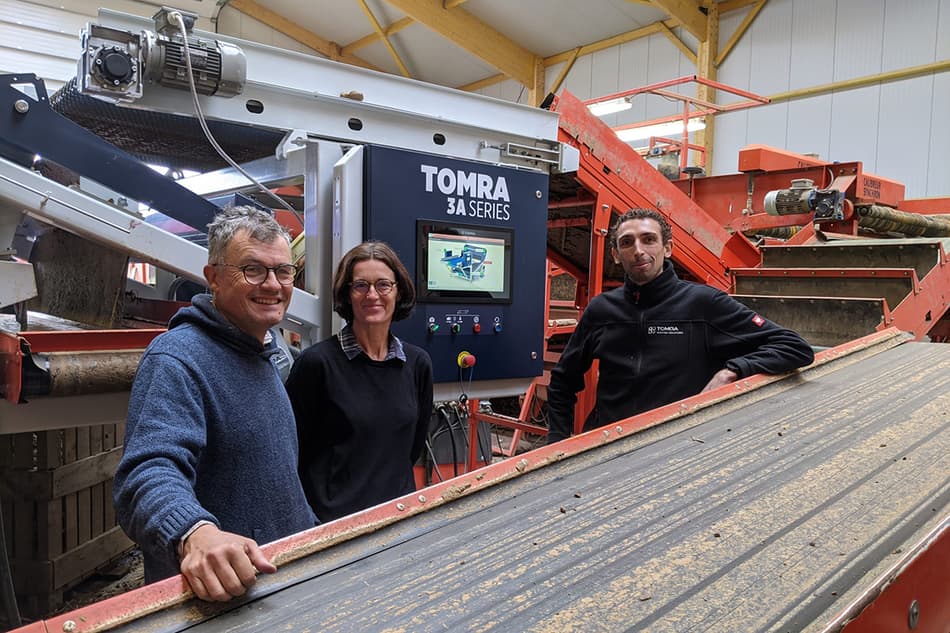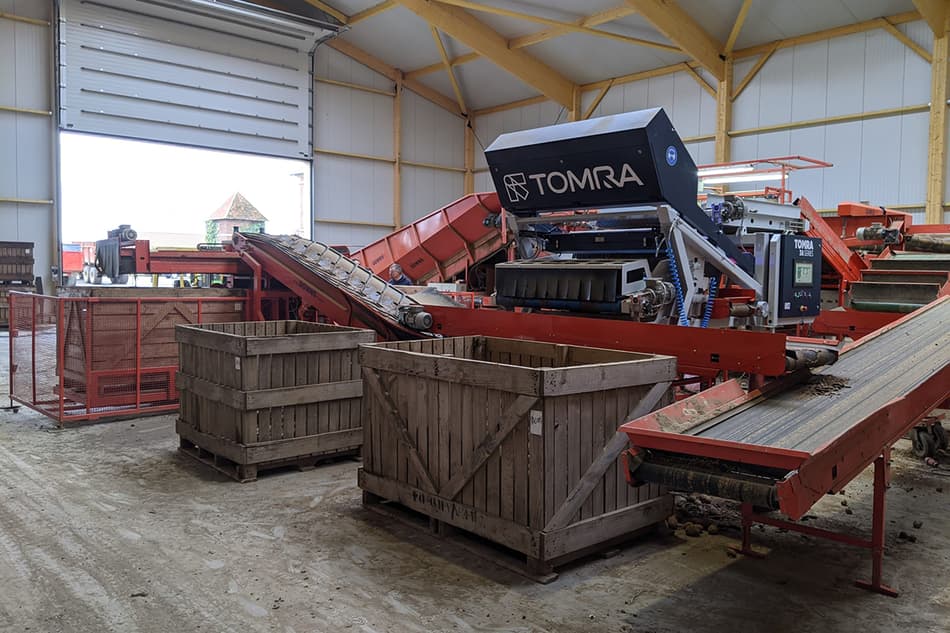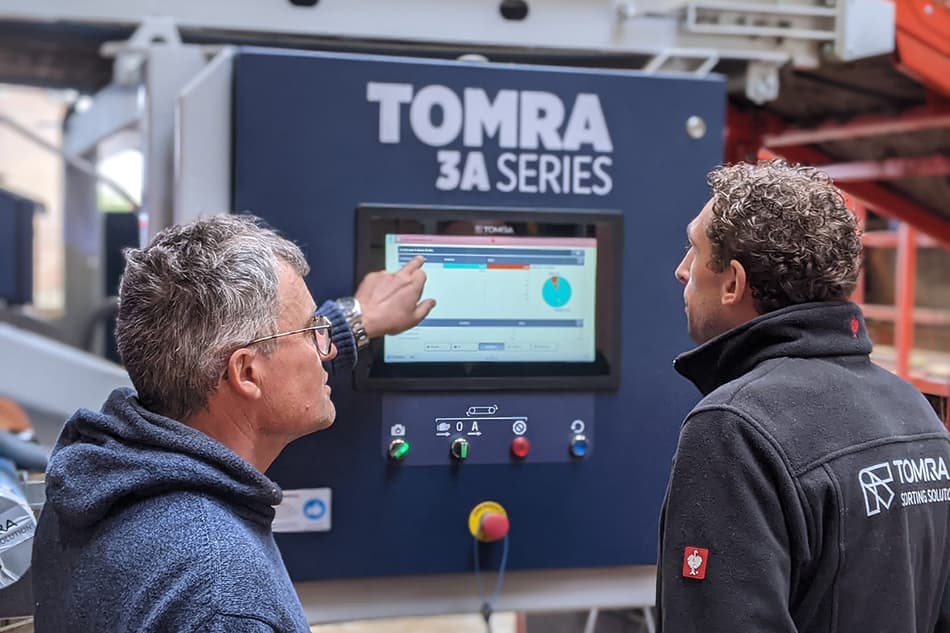Get in touch
Every Resource Counts™

The farm of Tremonvilliers (Oise) is equipped with a TOMRA 3A to sort its potato and red beet crops. The Tremonvillers farm installed a TOMRA 3A sorter in the Fall of 2020 in a specially built shed to sort and prepare its potatoes and red beets as they leave the fields. The TOMRA 3A gives farmers complete control over the production cycle: adapting to harvest peaks, providing unrivaled sorting quality, and eliminating the need for manual sorting. The TOMRA 3A has been operational for a few weeks and should pay for itself in three years.
Damien Renard, director of the EARL de Tremonvillers, has been collecting Quality certifications for 25 years: QUALITAIR, GRASP - GlobalG.A.P., HVE Level 3. Industrial customers make it, in some cases, a sine qua non condition for referencing. These quality labels also bring meaning to Damien's profession by validating or challenging his processes during the audit phases before certification.
At the Tremonvillers farm, we don't lock ourselves into habits; we seek to move forward, observe safe practices, and invest in useful innovation. This was already the case when his father was one of the first in the region to set up irrigation systems, diversify into vegetable growing, and produce potatoes.
The farm of Tremonvillers in the Oise has been owned for three generations by the Renard family, and today, Nathalie and Damien manage the operations. In Picardy, wheat, rapeseed, spring barley, and sugar beet are the usual crops you would find and already occupy more than 100 hectares of these great plains. Although Tremonvillers did not specialize in potatoes, modifications in the CAP (Common Agricultural Policy) and repeated periods of drought have accentuated the desire for diversification. Thus, in addition to the 30 hectares already dedicated to progressing the farm's agriculture, 150 hectares now sow potatoes, and another 10 hectares are devoted to cultivating red beets.
The harvested crops are sold in bulk, or big bags, for the fresh market, industry and traders. They deliver to the food and french fries industry's major brands throughout Europe in France, Italy, the United Kingdom, The Netherlands, etc.

In the autumn harvest, the uprooting of the Oise's compact earth delivers tubers coated with soil. To sell them, it's necessary to apply preliminary quality sorting to detect green potatoes and remove clods and stones. For 8 hours at a time for days on end, it's a tricky task for the human eye but flawlessly performed by the latest generation of ready-to-use optical sorting machines. After seeing the capabilities at a trade show and again up close and personal at a colleague's home, Damien Renard decided to acquire his TOMRA 3A at the end of 2019.
Beyond the quality brought about through automation, the possibility to regain full control of production was a trigger for the investment decision. TOMRA's optical sorting machine's arrival provided a robust, continuous, and substantial reinforcement to the operation. With the on-demand, reliable sorting of tons of tubers during the peak of harvests, the workload increased without an additional workforce.
Five full-time equivalents work year-round on the farm, the management couple, two employees, and two part-time apprentices. The potato harvest required seasonal human resources, at least five people assigned exclusively to the sorting of products arriving from the field.
For this monotonous task, the candidates do not jostle for jobs in the surrounding area, and the foreign workforce does not always acclimatize. The result is 20 years of episodic tension in the recruitment and management of staff that could have taken a catastrophic turn this last year during a global pandemic seeing nations closing their borders to slow the spread of the COVID-19 virus.
But fortunately, at the end of 2019, Damien Renard had the idea to cement a solution for a two-decade-old dilemma and purchase an optical sorting machine.
Outworking what a team of 5 people would do, and with a permanent level of quality, the TOMRA 3A is operational at any time of the day or night, without any drop in speed, allowing consistent rhythm between the digging and the arrival of the skips. This flexibility is vital because, during the harvest period, it is the weather that rules: rain causes works stops for long half-days, delays work late into the evening, and sometimes, pulling weekend shifts are necessary to catch back up. As a result, the final cost of temporary labor is not defined, from one year to the next, and is mainly dependent on the impact of unpredictable overtime.
Today, the TOMRA 3A handles 30 tons/hour, and semi-trailers take only 30 minutes to fill with thoroughly sorted, top-quality goods.

Chosen in December 2019, ordered in June 2020, and delivered three months later, experts installed the TOMRA 3A under a hangar on-site at the digger's exit at the Tremonvillers farm this September. The equipment's installation, the adjustments, and the user training took two days.
"Two worlds are in dialogue during the project management phase, that of agriculture and that of industry, on the one hand, a family business, on the other, a standardized world that must secure the installation and configuration. We filled in all the information to document the planning, the checklists, and the delivery went really smooth," explains Damien Renard.
Once the TOMRA teams had left, the remote control system fulfilled its support role. There is no need to wait for a technician to arrive in the event of an operating incident. Diagnosis, resolution, and a restart are administered immediately and in record time, with the TOMRA after-sales service team providing support from nearby sites in Mulheim-Karlich (Germany) and Montpellier (France).
The new tool revolutionized production and delivered a solution for the variables that had tormented the farmers for more than 20 years. Operators are entirely autonomous, managing the device on an intuitive touch screen, and now, working in pairs, are in control of the 2020 harvest and obtaining better quality potatoes, without soil and pebbles stored in their fridge.
